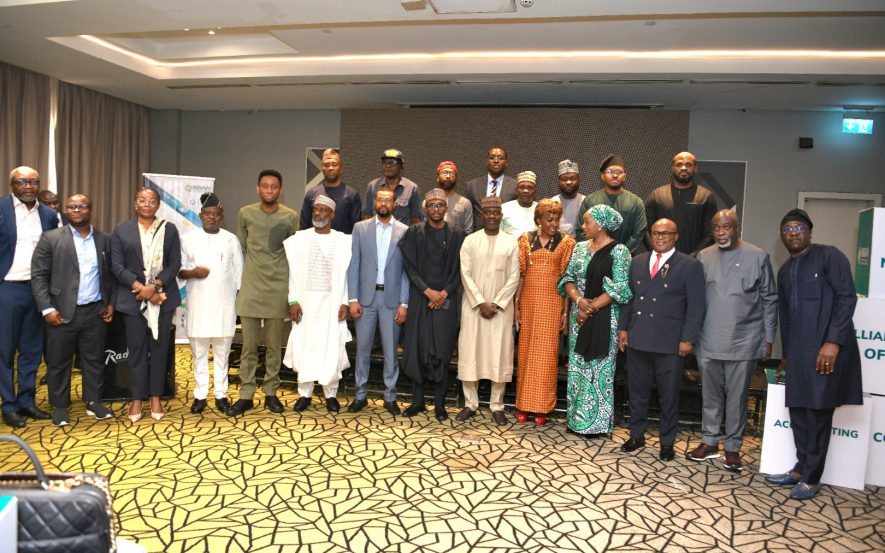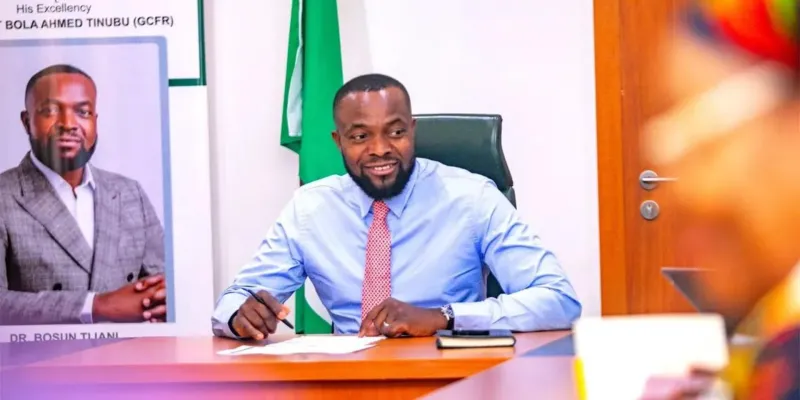On February 4, 2025, Nigeria took a bold step toward universal broadband access with the launch of the National Broadband Alliance for Nigeria (NBAN). The landmark event, attended by key stakeholders including Civic Hive took place at Ikeja, Lagos and was spearheaded by the Ministry of Communications, Innovation, and Digital Economy, under the leadership of Dr. Bosun Tijani.
At the core of this initiative is the government’s commitment to bridging Nigeria’s digital divide by accelerating broadband rollout and ensuring affordable, high-speed internet for all.
 The National Broadband Alliance is designed as a multi-stakeholder collaboration, bringing together public and private sector players, as well as civil society organizations, to create sustainable business models for broadband expansion. The Broadband challenge highlights low-fibre network penetration as a critical barrier to digital inclusion, making it difficult for millions of Nigerians to access reliable internet. To tackle this, the initiative’s first rollout phase targets seven states which are Edo, Ogun, Kwara, Katsina, Imo, Abia, Borno, Nasarawa.
The National Broadband Alliance is designed as a multi-stakeholder collaboration, bringing together public and private sector players, as well as civil society organizations, to create sustainable business models for broadband expansion. The Broadband challenge highlights low-fibre network penetration as a critical barrier to digital inclusion, making it difficult for millions of Nigerians to access reliable internet. To tackle this, the initiative’s first rollout phase targets seven states which are Edo, Ogun, Kwara, Katsina, Imo, Abia, Borno, Nasarawa.
Goals of the National Broadband Alliance
The Alliance is not just about infrastructure, it is about economic growth, innovation, and digital empowerment. Some of its primary objectives include:
- Stakeholder Collaboration – Encouraging partnerships among government agencies, telecom operators, technology providers, and civil society to ensure inclusive broadband usage.
- Expanding Internet Access Nationwide – Ensuring connectivity across all 774 Local Government Areas (LGAs) in Nigeria.
- Sustainable Business Models – Developing viable investment frameworks to make broadband deployment financially sustainable.
- Enhancing Critical Public Institutions – Prioritizing schools, hospitals, government offices, libraries, and markets as primary beneficiaries of improved internet infrastructure.
- Promoting Digital Consumption – Encouraging digital goods and services adoption in newly connected regions.
- Supporting Smart Technologies – Implementing sustainable broadband deployment and maintenance technologies to ensure long-term efficiency.
- Establishing Local NBAN Nodes – Setting up regional coordination centers in all states to oversee broadband expansion efforts.
Key Players in the Broadband Alliance
The success of the initiative relies on the active participation of diverse stakeholders, including;
- State Governments & Federal Agencies (To facilitate policy implementation and provide necessary approvals),
- Telecom Operators & Technology Providers (To drive infrastructure deployment and innovation),
- National and International Organizations, Including the Nigerian Governors’ Forum (NGF),
- World Bank, and African Development Bank (AfDB), to provide financial and technical support,
- the Civil Society & Community Groups (To ensure broadband access benefits marginalized communities and promotes digital inclusion)
Highlights from the Launch Event
The event featured key addresses and project presentations, underscoring the government’s dedication to digital transformation. In his keynote address, Dr. ‘Bosun Tijani, the Honourable Minister of Communications, Innovation & Digital Economy, who was represented at the event by Dr. Aminu Maina, Executive Vice Chairman of the Nigerian Communication Commission (NCC), said, “Despite our collective goals of achieving 70 per cent broadband penetration by 2025; delivering minimum data speeds of 25 Mbps in urban areas and 10 Mbps in rural areas; Expanding population coverage to 80 per cent by 2027; Increasing broadband investments by 300–500 per cent by 2027, including the growing availability of fibre networks, Nigeria faces an unfortunate paradox.”
Report on Community Networks Project by Y.Z Y’au, Executive Director of the Centre for Information Technology and Development (CITAD), highlighting the role of community-driven broadband initiatives.
- SABER Report (State Action on Business Enabling Reforms) Presented by representatives from NGF and the World Bank, addressing policy reforms to support broadband expansion.
- Project 774 – A broadband initiative by NigComSat, focusing on ensuring internet connectivity in all 774 LGAs.
- Broadband University Project – A collaborative effort by Galaxy Backbone and Huawei, aimed at integrating broadband services into Nigeria’s higher education system.
A Step Towards Digital Inclusion
The launch of the National Broadband Alliance for Nigeria marks a transformative moment in the country’s digital landscape. By fostering strategic partnerships, developing innovative funding models, and prioritizing underserved communities, this initiative has the potential to bridge Nigeria’s digital divide and propel the nation toward a more connected and technologically advanced future.
As broadband access expands, Nigerians can look forward to improved education, better healthcare, enhanced government services, and new economic opportunities, all powered by reliable, high-speed internet.


